the journey of the book
my book in bookstores, the life of the book, living as an itinerant writer in Delhi, and parents' home
Dear Reader,
Thank you for being here.
Some housekeeping… This email may end up in the Promotions tab of your inbox, or worse, spam. Please move the email to your Primary inbox. Looking Inwards letter will be there from then on.
I sent the previous letter from the Indian Institute of Technology Delhi (IITD): my alma mater. I remember sending pictures of walking around the campus with my first book, Journeys Beyond and Within…. Much has happened since. Many book signings, book launches, events, conversations, and overwhelming book reviews have come my way.
I’m also thankful for the incredible support I have received from my professors at IITD. A special mention to my professor Amitabha Tripathi, whose Mathematics course I passed eighteen years ago, not with flying colors, and who is now celebrating my book, reading it, and has gifted it to two other people already!
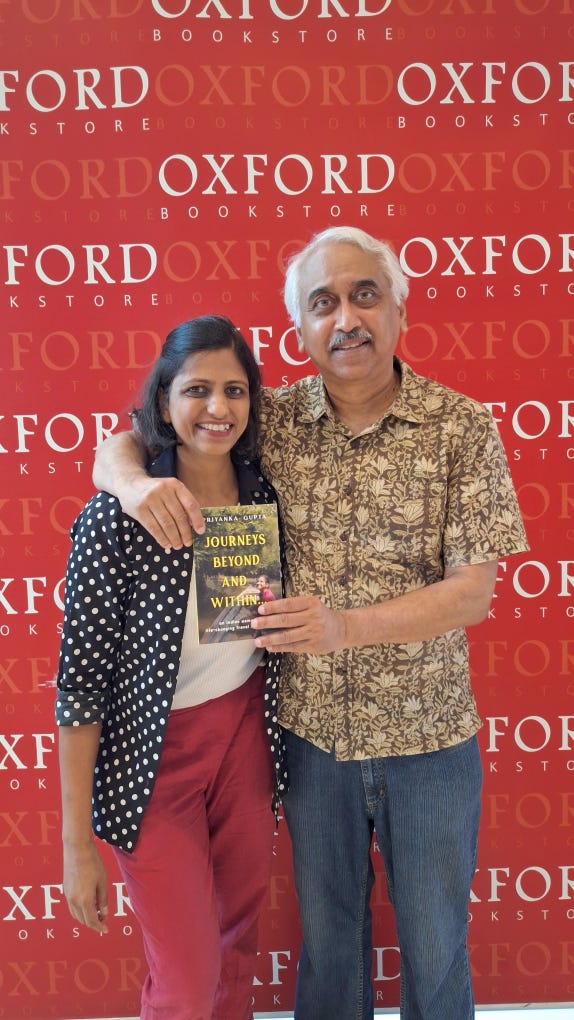
Prof. Tripathi traveled with me and my husband in the Delhi metro (local Tube/train) from IITD to Connaught Place: nine stops and a line change away, stood for twenty minutes grasping the handles: no one vacated their seats for this senior citizen even after I asked, did the return journey home the same way, was sporty enough to have dinner with us, and then dropped us at our guesthouse, telling me what he would be doing next for my book.
Maybe you’ve already seen the above picture on social media, where I’ve been putting up the event updates: to quickly share so much that is happening. I haven’t (suddenly) become a social media fan, but the platforms have made it easy to connect with people I had lost contact with long ago. And with readers who read my blog and letter in the past and at the moment can’t prioritize reading and so skim through social media. I have also connected with many old friends, colleagues, school friends, college mates, fellow travelers, acquaintances, bloggers and writers of all ages, journalists, reviewers, new readers, and so on.
The most recent and exciting update — that you might have guessed and that I shared very briefly in the last letter — is that my book is now out in bookstores around India. It’s in major bookshops and book cafes in Delhi, Gurgaon, Dehradun, Chandigarh, Agra, Ahmedabad, Thrissur, Bangalore and Mysore (Sapna Book House), a couple of stores in Mumbai, and is coming out soon in stores in Hyderabad, Goa, Pune, Kolkata, and so on. The journey of this book, which in itself is called Journeys Beyond and Within…, has been incredible. As I have self-published the book—rejecting the publisher’s contract as I had mentioned earlier too—I never thought I’d try to get the book in brick-and-mortar stores.


I wanted to sell the book online. I didn’t know that so many readers still buy from bookshops.
Then it all started when I arrived in Delhi a little more than two months earlier, around 18th February. Scrolling through some amazing book reviews on the phone and looking at the big bookstores in front of me, I thought: Hey, my book, should be in these shops. My book is good. It should be here, behind these shining glass windows. Why are all these books here and not mine? I pitched and sold my travel memoir to many hawkers and small shops, some of whom paid me and some who said, “We’ll pay you when we sell this copy.”
The one most amazing thing a hawker told me was “If you want your book to be here, give it to this book distributor. We’ll get it if they have it. Their shop is just around the corner.” Handing me my copy back, the hawker started responding to the semi-interested buyers who were cursorily picking up Atomic Habits, The Monk Who Sold His Ferrari etc, enquiring about prices.
Woah! What attitude!
I was the writer, they were the sellers. And they definitely had the ego of a seller. They know you depend on them to sell their books. I was far from this knowledge that most of those cheap books were pirated copies, printed illegally in some bylanes of Daryaganj: the area of shoddy printers, publishers, and distributors. The story goes that they all sit across from each other, but the publishers don’t dare to interrupt this illegal business, neither through goons nor through legal courses. While publishers work all year to get books out, the printers pick up the bestsellers and print cheap copies in bulk. These are then sold by hawkers for 100 or 200 rupees (around 1-2 dollars).
What I did know was that I needed to visit this distributor. I followed the Google Maps directions and reached the office.
The first time my partner and I go, the boss isn’t there. It was a Saturday perhaps. On Monday, we go again, my stomach churning. The boss is still not there. The guard says, “What can I do? The boss isn’t here.” “When will he come?” I ask. He says, “I don’t know. Should have come today but hasn’t.” It takes me a couple of days to get back. I get my periods and spend the whole day in the room. My partner runs out to get food for me. This time we return to the distributor, the boss is in. I linger in the office, walking through the aisles of books. The office is large, but there are so many books I can hardly tell how much space is there. Books are stacked everywhere. This entire shop is overtaken by them. This is a book distributor, and it means business.
I try hard to not be seen. There is someone in the boss’s glass cabin, and a team of four men sits on the right side of the cabin — surrounded by books stacked up to the roof. I’m the only woman; Then I had not noticed the middle-aged lady who sits on the left side of the cabin, doing accounts. I don’t want to be seen waiting, waiting for a boss who would most probably refuse to distribute my book. I don’t want to say: I self-published my book. Would they believe I had a publisher’s contract?
While browsing through some books, a man asks me, “Yes, ma’am?” I look at him and say, “I had to meet, sir,” and holding up my book, I say, “I had to show him my book.” I point to the cabin. He points me to the group of men on the right side of the cabin. On a previous visit, I had walked around the shop, the laughter of these men roaring in the large office. The boss’s cabin was empty. I had made very poorly of these employees. They are wasting away time because the boss isn’t here. I had not taken any of them seriously and had left, asking the guard when Sir might be expected.
Now this man sends me to this collection of men. “There is Robert sir. Meet him. He handles all this work anyways.” I smile and walk in the pointed direction, quietly rehearsing what I have to say. “Sir, my book has just come out. It’s a travel book, full of stories of my own adventures and struggles, and is getting great reviews. I’m from IIT Delhi, and I changed my career to write. The book is published in India and outside too. I had a publisher’s offer but I didn’t take it.”
At the desk, four men are sitting, two on each side of a desk with a neck-high partition in between, three of them in front of computers and Mr. Robert, to whom I have been directed, without one. I say hello, hand him the book, and repeat the rehearsed lines. He nods along and turns the pages. Asks me a few questions and speaks along. Then he says, “Your book is travel book. Should sell. Should do good. Show to the boss.” He points me to the boss’s cabin. The boss is already speaking to someone. But Robert wants me to go in. I say, “Sir I’ll wait. Someone is there.”
I browse through some more books, my eyes shining with excitement. When I turn around after a few minutes, someone else is inside the cabin. I got it. Robert wanted me to go in because someone or the other would always be there. I go back to Robert. “Sir, someone else has gone in.” I say pointing to the glass cabin, where the old, plump boss sits in white overalls: a white kurta and pyjama. Glasses on his nose, his face lowered down into his phone and then up to the people around him, he looks serious.
Robert ushers me in. I stand behind the empty chairs. Robert stands on the side. He has told Sir about the book. I keep standing until the owner points me to sit down. I hand him my book and say what I had told Robert, who has now gone back to his seat. Sir nods along, turns the pages of the book slowly, and tells me they take books on discount. Robert had told me. The discount is conveyed to me, and my rough calculation tells me it might work. At least I will get more than what I am getting from current online sales. I assume that for books in bulk the printing company, Notion Press (NP), that is making the books available online will give the books to me at a discounted price. Sir looks up at me, “You can give us 100 copies to begin with. Do you have 100 copies? You can give fifty also. So that if it doesn’t sell it’s okay.” Something like that. I quickly reply, “No, Sir. I’ll give 100 copies. The book will sell.” He smiles. He tries to explain to me how the discount and the bill etc would work, and I tell him I’ll understand from his team.
I’m ecstatic, with a big grin on my face. Outside, Robert shows me more books and tells me I should write about trekking in Uttarakhand etc. “This is in demand. Uttarakhand trekking books.” I’ve written a whole travel memoir, and he wants me to write a trekking guide? Somehow his attention returns to my book. “Your book is on travel madam. It should sell.” I tell him the kind of stories that are inside. He says, “You have worked really hard.” Then everyone explains to me how the bill should look with the discount, and with this, I leave.
My partner had gone downstairs a while ago; there was nothing for him to do in the shop, and one person lingering is better than two people lingering. I call him, and we meet. “They will take 100 copies.” We look at each other, grinning. He is ecstatic too.
There is this one question we were not thinking deeply about and which the distributor had also asked me. Where are the 100 copies to give? We will think about that later. Of course, in a week or so the print company should be able to deliver the books in Delhi. When I had told Robert and Sir the printing cost of the book, Robert had said it was too high. “These NP people loot authors.” These were his words. Now I push the thought of the printing aside. It’s time to celebrate.
Instead of celebrating, we visit more bookstores around Delhi to ask them if they’ll keep my book — that’s a celebration too. We take the metro and walk in the sun that’s burning us. Though the mornings and evenings are still cool — it is February — afternoons are harsh. When most bookshops tell us they get their books from the distributor we had been to, we both relax and breathe deeply. I pick up the red semal flower from the ground and admire it, a feeling of satisfaction running deep through me.
It’s night by the time we return to our small hotel room in Paharganj, the busiest area of New Delhi, where the railway station sits. After two nights at a friend’s house in Gurgaon and one in a disgusting hotel, we had gone to this hotel. For a budget hotel, it had a good rating, and we were shown a clean room. Windowless but clean. The receptionist and the staff seemed simple and professional. The next day was too soon to leave. So we stayed. And then the hawker visits, street food adventures, and distributor chase left us no time to shift. The strong sun glowered above our heads every day all day, as if daring us to think of leaving our current home and going elsewhere. We didn’t take him up on his challenge; there were enough other challenges. The hotel was convenient. Every day, we gave keys, instructions to clean, keep the toilet roll etc, and returned to sleep.
The next day after the distributor visit, I got Delhi belly. When I was not in the toilet, I was in bed. My partner ran out to get food. There was nothing simple and light to eat. Restaurants and cafes surrounded us but nothing to eat. He went into a South Indian joint in the hope of oil-free healthy food but returned with large boxes of expensive food soaked in ghee. My partner overbought, as always, but small portions didn’t exist at that shop. A simple khichri, the lentil-rice mix, would have done but there was none. Nothing brought me respite. In a windowless room, there was nothing to open and look out. One glass opened into the duct running through the building, close to the kitchen. Another one into another duct which was betel nut stained. I quickly shut it, feeling the bile rising from my stomach into my mouth.
A good thing happened though. After a long follow-up and multiple emails, I got a three-day booking at a new guesthouse within IIT Delhi. The alumni department didn’t respond to my emails regarding the booking in the alumni guesthouse but this newer guesthouse given on contract to a private company was quick on emails and phone and told me they have rooms. The reservation was from the day after though.
The next morning, empty-stomached, tired, and groggy, we pack our bags. My partner hints, “Should we make a transition today? You are not feeling well. Just one more day perhaps we can stay.” He looks at me the way he does, imploring me to compromise. I say, “If I stay here, I’ll be sicker. I’ll never get better. There’s no air, food, or anything here. You know we have learned in the past that though staying may look convinient, we should get over the inertia and find better. A change will fix me. Let’s go now.”
We pack our bags and run for our lives. Our car is dusty and pigeons have done their job — perhaps they had Delhi Belly too — but we leave. This time we go to Hauz Khas village, a happening area in Delhi only to realize that place is crowded and crazy. You park your car out in the parking, pay a hefty parking, and squeeze yourself into these tiny lanes, looking up at hotels. We talk with many and check many rooms, but I have never liked congested places. Prices are high. Not even one place feels joyous, comfortable, cooperative, or polite.
One fat-bellied guy sprawled on a dusty sofa at a dark, depressing reception says to his subordinate when we ask for a room, “Give them a room. Give them that one, or that one. Give them a room.” I am flabbergasted; my apologies for using that term a bit much today. I look at my partner, my bulging eyes conveying (hopefully) what I couldn’t say. “What does he mean by give?” He looks back at me, assuring me in his usual way, “Let’s see how it goes.” The rooms are okay, nothing special. They are still being cleaned. Downstairs, the man is still sprawled, and he repeats, “Give them a room.” He seems to be doing us a favor, and I wonder if he has forgotten that we, as customers, will pay for it. I think of telling him but I don’t. Instead, I’m reminded that this is why I avoid cities: the balance between supply and demand is skewed. Why is there so much demand for this hotel which doesn’t even care to put up a good appearance?
Because guests can see a lake and some ruins from the windows. That’s the X-factor.

We come out. Our car is parked on the road now. My partner wants to put it back in the parking and go check another room. I’m famished. Haven’t eaten since morning and "not eating to keep my stomach empty and good" is making me dizzy. I sit in the car, and now we are arguing. He goes and checks the rooms. Twenty minutes later, he shows me videos and tells me the rooms are okay. We will get it within this price. I think, for the first time in the whole day, perhaps this one will work out. It’s just a day. But then he says, “The old, owner uncle was saying, ‘A foreigner will come at this time to see the rooms. Can’t do anything about it. I have promised him.’”
This information makes me shift in my front passenger seat. Indian hotel and guesthouse owners prefer foreign tourists, especially foreign tourists who stay for a longer duration. This one needed the room for a month. So the owners would give you the room, as a favor, but they will continue to accommodate the foreign travelers the best they can, even at the cost of your comfort. Doesn’t matter that you’d be paying a high price for an average room. The foreigner would be paying less than you per day (because he is staying for longer). Wherever I sniff this secondhand treatment of Indian guests, I run in the opposite direction — I bet they wouldn’t have asked a foreign tourist to open her room and show it to an Indian guest. I would love to give the out-of-country traveler a little more comfort, I know how hard it is to travel in an unknown nation, but not always at the cost of my own. “Finally to check-in into a room after this really, long tiring day only to be disturbed at an unknown hour to open up our space to invite strangers in while they assess it at their comfort? You know how sick and hungry I’m? Might faint if I don’t eat.” I watch my partner open-mouthed. He is looking at me, still with the expectation, “This is just for one day. Let’s stay. Let’s adjust.” I say, “Let’s leave.”
By now I have looked at a guesthouse online. I think it will work out. We drive on. The new hotel is in a location close to IIT, where we’ll be going the next day. The guard at this hotel ushers us into the basement parking, takes us to the reception, and we are shown rooms. The area is quiet, the rooms are clean, and the hotel seems it would do. We take one room on the terrace, ask for the toilet to be cleaned, the floor to be wiped, and the tray and cups to be washed—the best hotel is the one where we don’t have to do any of this but that’s rarely the case. We have a booking for the next three days at IIT. With a home for the next four nights confirmed, we are kings.
We put down our bags, call the kitchen, and request for khichri. “Could you please make khichri? Our stomach is not that well. Less spices please.” On the other side of the phone is a polite and enthusiastic chef who replies, “Of course. Just try our khichri and you’ll see.”
Half an hour later, it’s about 7:30 pm now, I haven’t eaten a grain, and we are served two pots of khichris. It is fresh, smells good, and looks light. We devour it like two hungry kittens lick up bowls of milk, and ask for another portion which is brought another half an hour later.
The hotel seems worth it for just that khichri which brings us energy and peace. We also sleep like kittens, ready to pounce away the coming morning. And that’s exactly what we do. We reach IIT, check-in, and immediately relax in my sprawling, green campus. Though much has changed, many new buildings have come up, and students are perhaps four times more than at our time, this is still my campus. Apart from three days at a hotel where my parents also join us, for the next two months either we are at one or the other guesthouse of IITD (there are only two) or we go to my parents’ home, just a three-hour drive from Delhi. We need to be in and around Delhi for this book distribution and printing work.

Today I’m again at my parents’ home. I arrived here the last Sunday after spending close to a month in Delhi.
A month earlier, I had gone to Delhi from home. A promising printer was supposed to give me a sample of the book. It didn’t work out with the existing printing company, NP. Their book cost was high, and at the discounted rate I had to give to the distributor, I wouldn’t get much. I had spoken with tens of printers, visited one, and told him to give me a sample copy. He said he would do a professional job, and though there were certain red flags, I didn’t ask any other printer to print a sample.
Not only did I not get a good sample, but it was also very delayed. Instead of a matte cover, the trial copy was printed with a gloss cover. Whenever I called the printer, he was simultaneously speaking with other people, scolding his workers, or doing other chores. He said he would put up a new cover but that would take more time. Long, frustrating story short: The print was poor, the ink was light, the timeline was all shaken up, and the printer was rude and unprofessional.
That printer delayed me some ten days or so in getting my book to the distributor. Instead of feeling sorry for myself, I made a lesson out of this experience: Never depend on just one man/woman/business to do your job. Keep back-ups, always.
Long, happy story short: From the photos I had taken of the title pages in the books at my parents’ home, I picked up printers’ details and called many. I took samples from two printers, finalized one, and finally got the books delivered to the distributor on April 3rd.
For those who are new here, welcome. Here is the story of the inception of the book, what's the book about, how the writing journey has been, and how holding my first book felt.
The distributor was to take the book and put it in bookstores. Of course, I’d have to visit these shops and ask them to keep the book. That’s how things are done these days. It would have been easy to do this with a publisher but I’d still have to do the same.
Then bookstores would have said — “Hey, we don’t have the book.” I could have said, “Let me check with the publisher.” Call to the publisher: “Hey. How are you? You know I was here at this store in Tollygunge and the book isn’t here. What happened? Could you please send it?”
You become your own salesman. Which is what is happening now too. Except, the conversation at the store is like this: “Hey, I’m Priyanka. My first book has just come out. It’s a travel memoir, and it’s about some of my most unusual and challenging adventures. Along with the stories, I also narrate the difficulties I faced while traveling alone as a woman or as an Indian, or sometimes both. I’m a Computer Science engineer from IIT Delhi but have now settled onto writing so there’s a bit about how I explored different careers too. I open up about how my parents reacted to my choices, my solo travels, and that I’m not doing a job. The book has been doing really well and getting overwhelming reviews. It’s with this distributor and signings and events are happening... I'd love to have it at your store. How many copies would you need?”
They tell me how many copies they would start with. Or give me the contact of the owner or purchaser. Sometimes I get a phone number, at other times a WhatsApp, or an email. Occasionally, they ask me to visit again. I have waited an hour or half to meet someone, delaying all other plans. Some want me to send a sample copy. Others say they will speak with the distributor. On days, I’m alone, otherwise I’m with my partner. He has stood next to me, being incredibly helpful. Some days he can’t go with me.
This — writer's and traveler's journey — has been incredible. On the one hand, there are you: people who have subscribed to my stories and are receiving them in your inbox. There are you for whom I love writing and the audience who trusts me. Then there is a completely new idea of selling a book, writing it, oh no, first, there were the adventures that made the book, taking notes, then writing it, publishing it, …, and now getting the book printed, distributing it, making sure it reaches book stores and readers.
It's as hands-on as it gets, and I love that I'm giving my two hundred per cent.

I also want to share an incredible moment from the signing at Oxford Book Store. Mr. Vijay Lokapally, the celebrated and veteran sports journalist and author, who has been reading my book, came to the signing. I’ve enjoyed Mr Lokapally’s writing as much as I have enjoyed Ganguly’s and Sachin’s batting (for those who don't know, I'm talking about cricket, especially cricket from the time when I was a little girl). So it was an absolute HONOR to be in his presence and to see him hold the book. You can read some of Mr Lokapally's work here: https://sportstar.thehindu.com/profile/author/Vijay-Lokapally-12381/.

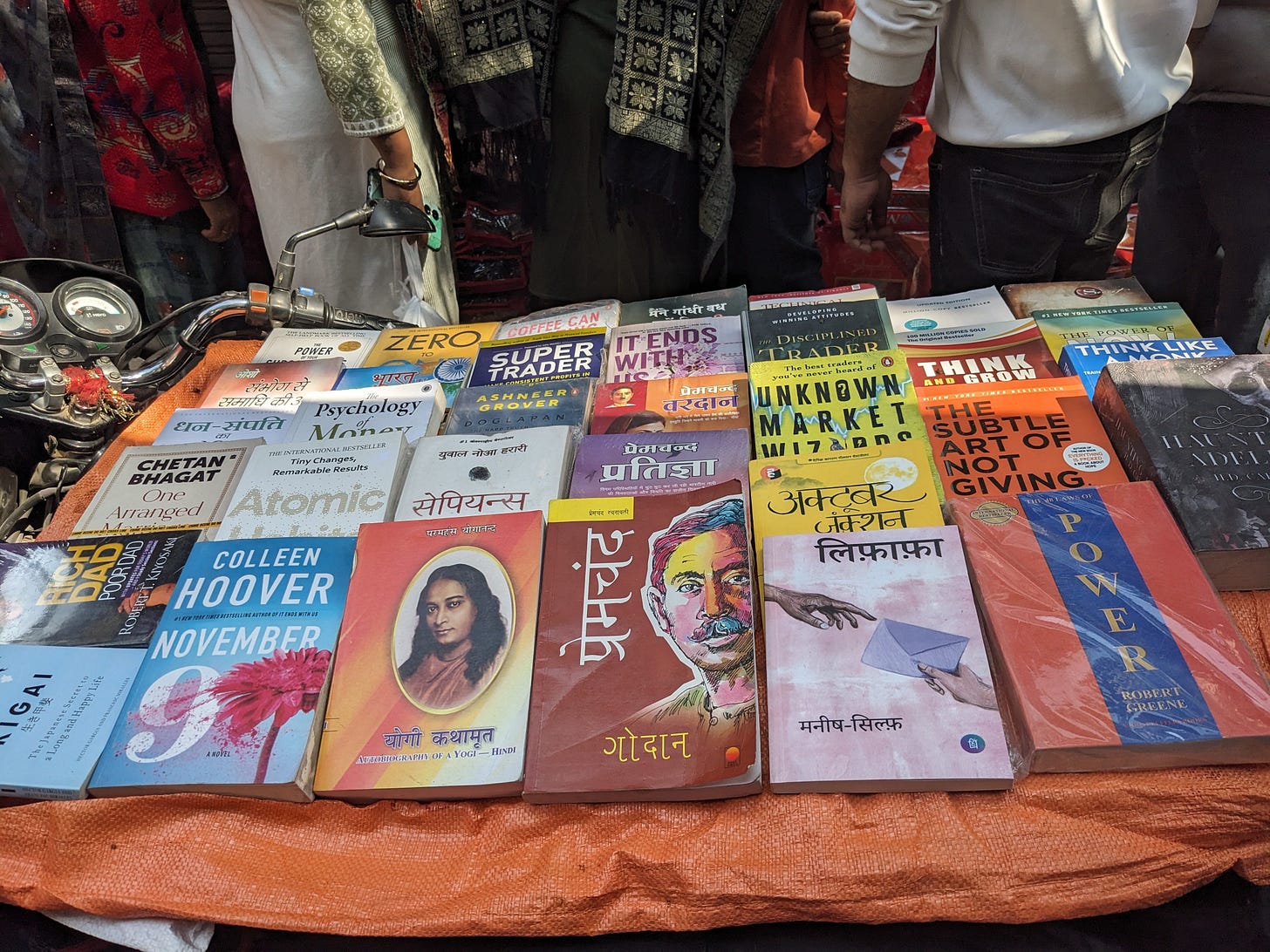
I can’t believe that all of this, and more, has happened in less than two months.
Feeling happy with ourselves, last Sunday, my partner and I made an impromptu decision to come home. We packed the car and drove here. We can do so because we don’t have a permanent home which is waiting for us to come take care of it. Along with us came bags of laundry, empty boxes that can be reused, and clothes to be repaired and stitched. Actually, at the moment, my mother is stitching an entire wardrobe worth of cotton clothes for me. There is no better way to survive the heat in India than wearing light cotton stitched by your mother. I'm so lucky and grateful :)
Besides everything, I also need to relish these moments with my parents. This cloth stitching, cooking, resting, talking. With my parents, I can enjoy a simple life. One in which afternoons mean buttermilk and evenings mean muskmelons. Things will take time. Lets’ trust the universe and the process! Let's do our best. That’s all.
There is a lot more to say, writing to share, the latest things I’ve read to list, to talk about the Pahalgam attack that has shaken the country, and much more. But for now, I’m closing the letter. Planning to send another one the next week, without a narrative but with only these updates.
Today has been a true behind-the-scenes of this itinerant writer’s life. Hope you have enjoyed the letter. Thank you for reading :)
My book, Journeys Beyond and Within…, is available on Amazon worldwide in paperback, ebook, and hardcase versions. Just search for the title. You know everything about the bookstores so I won’t repeat here.
I hope you have a lovely Sunday.
If you loved the newsletter, please forward it to someone you know. Have a friend who might like my book? Please send them this letter right away.
Psst. If you enjoyed this post, please click on the heart(♡) at the bottom or the top of this email. Your love helps others discover Looking Inwards, and makes me really happy!
Let me know what you think about this letter. Press reply.
Yours,
Priyanka
Looking Inwards is free for all! Subscribe to not miss a post.




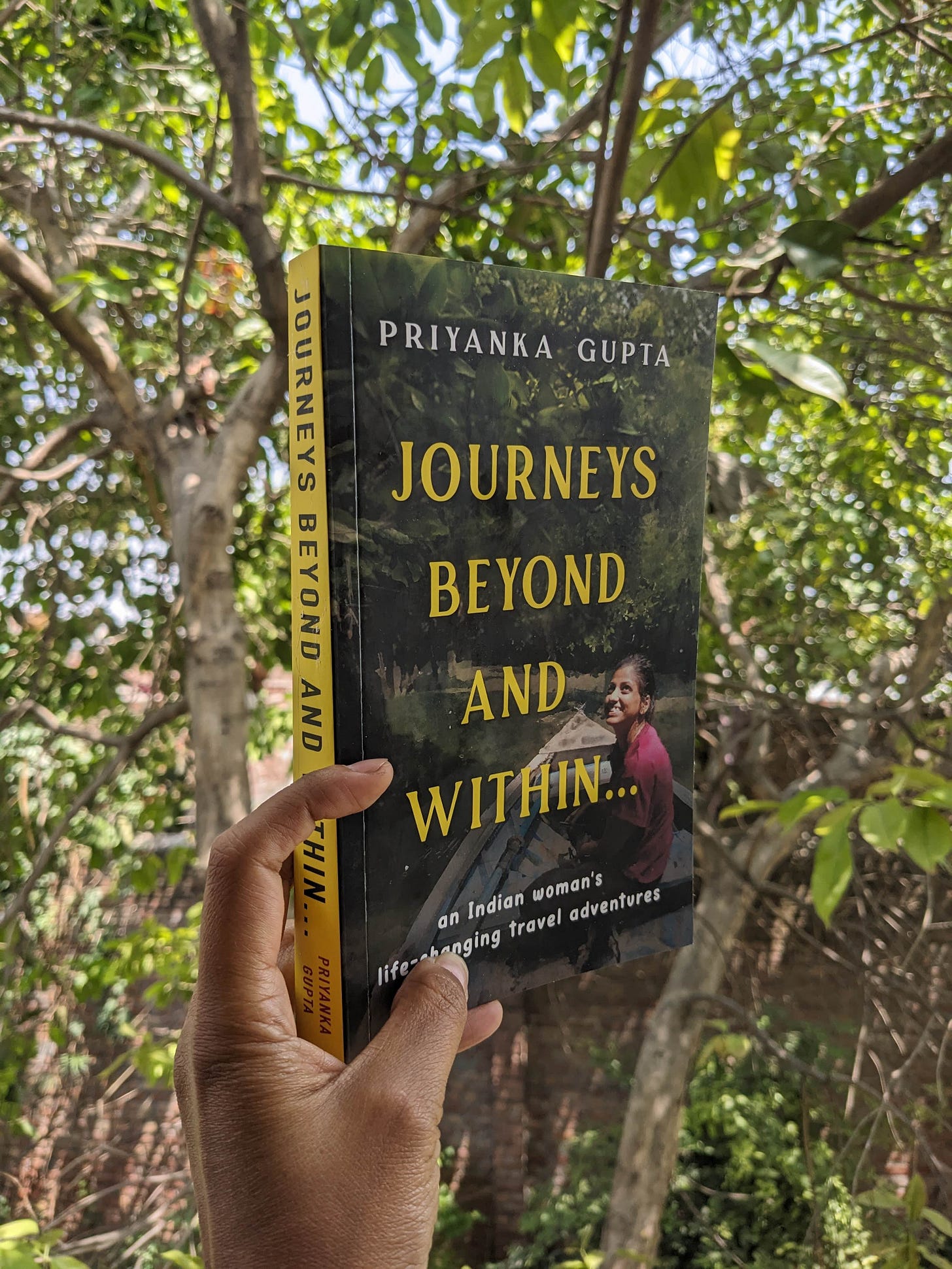
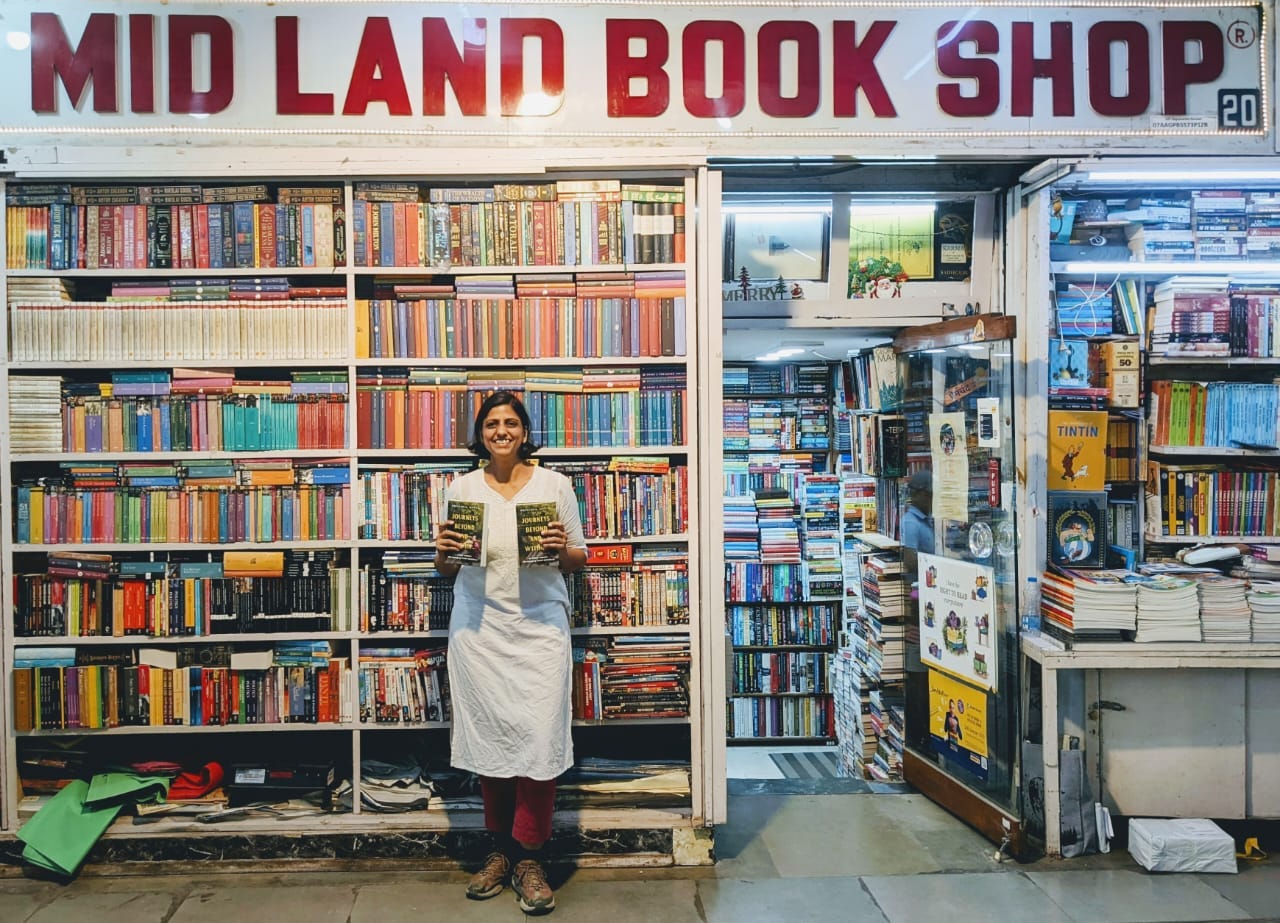



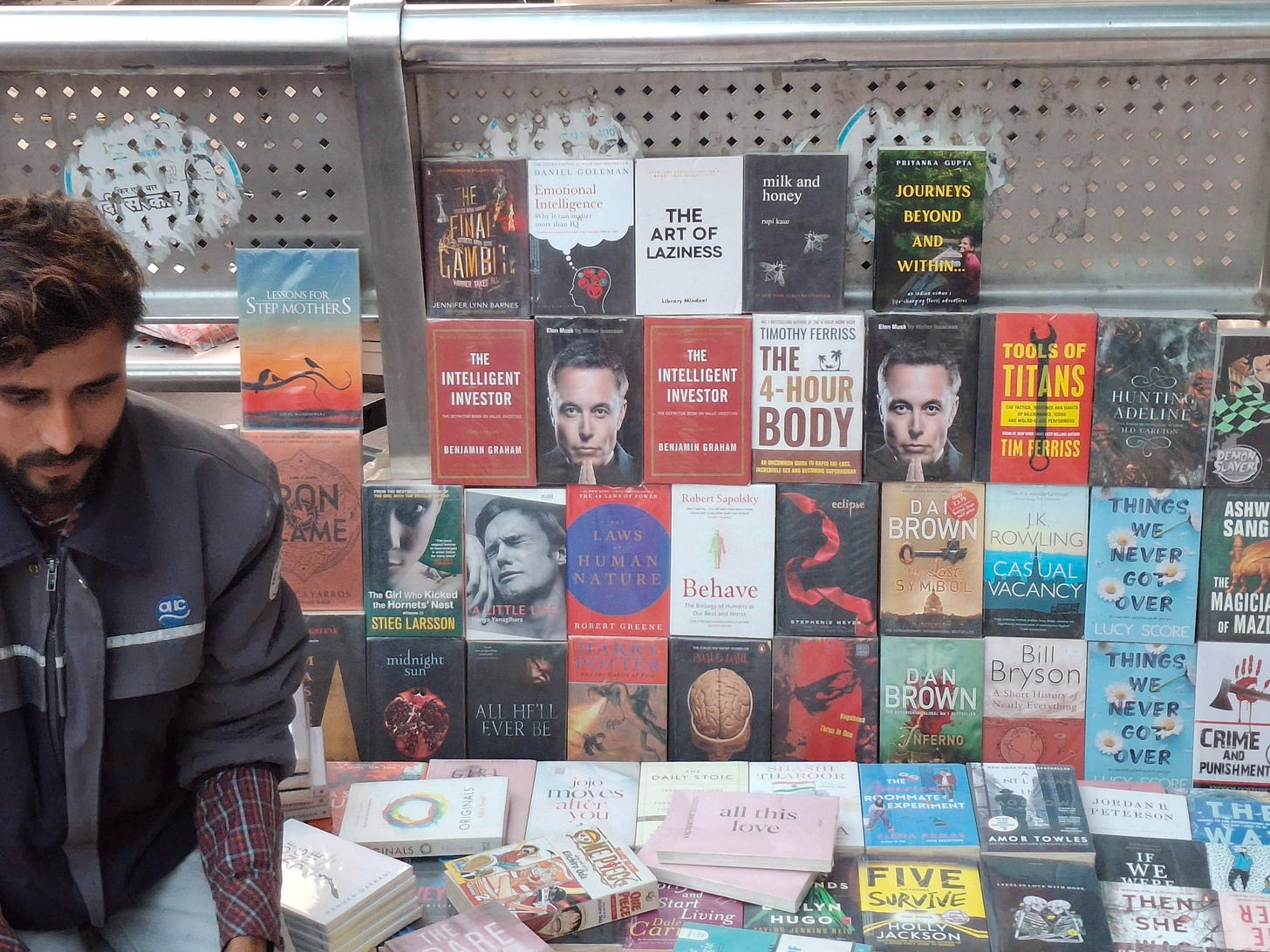

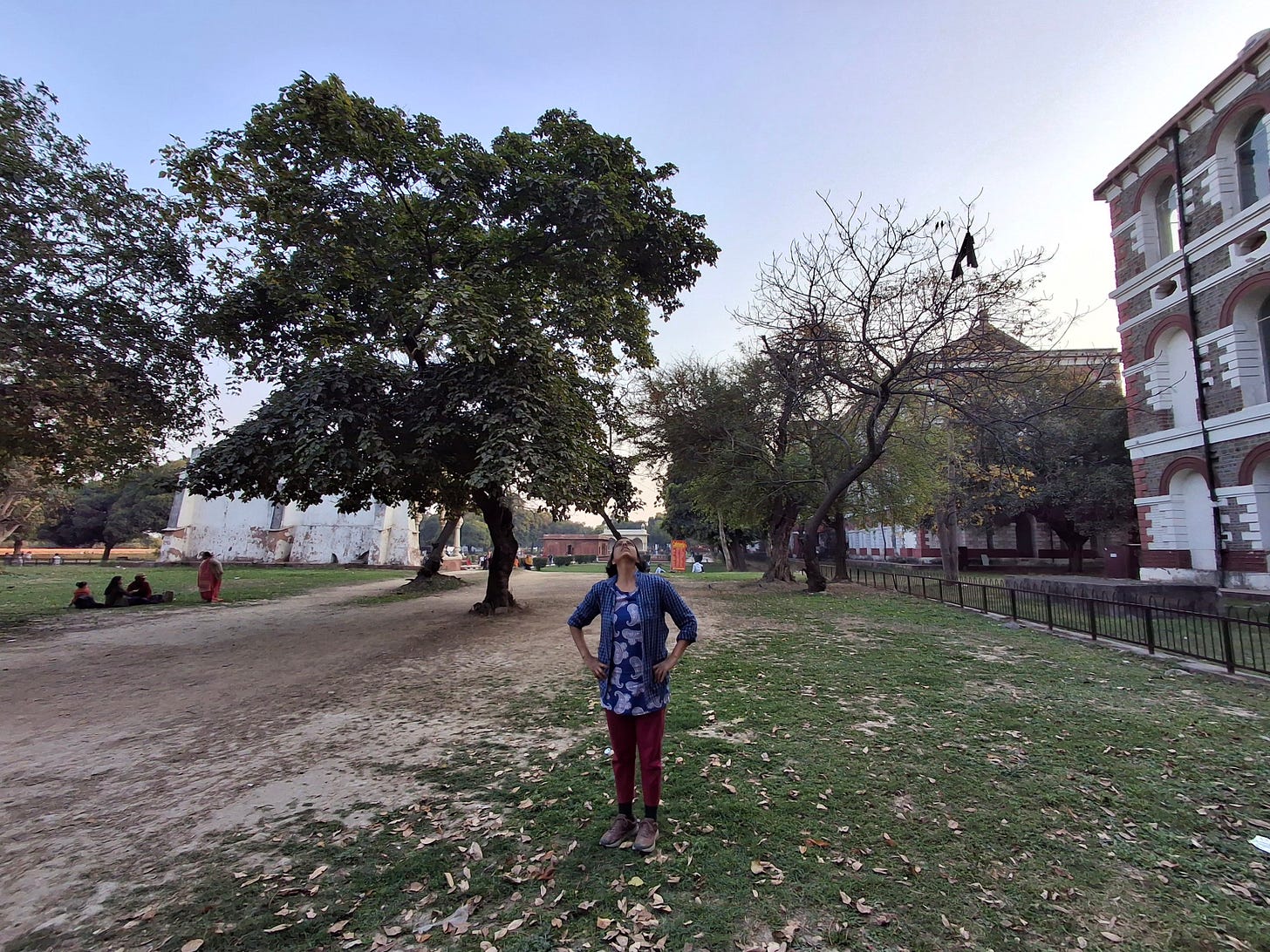
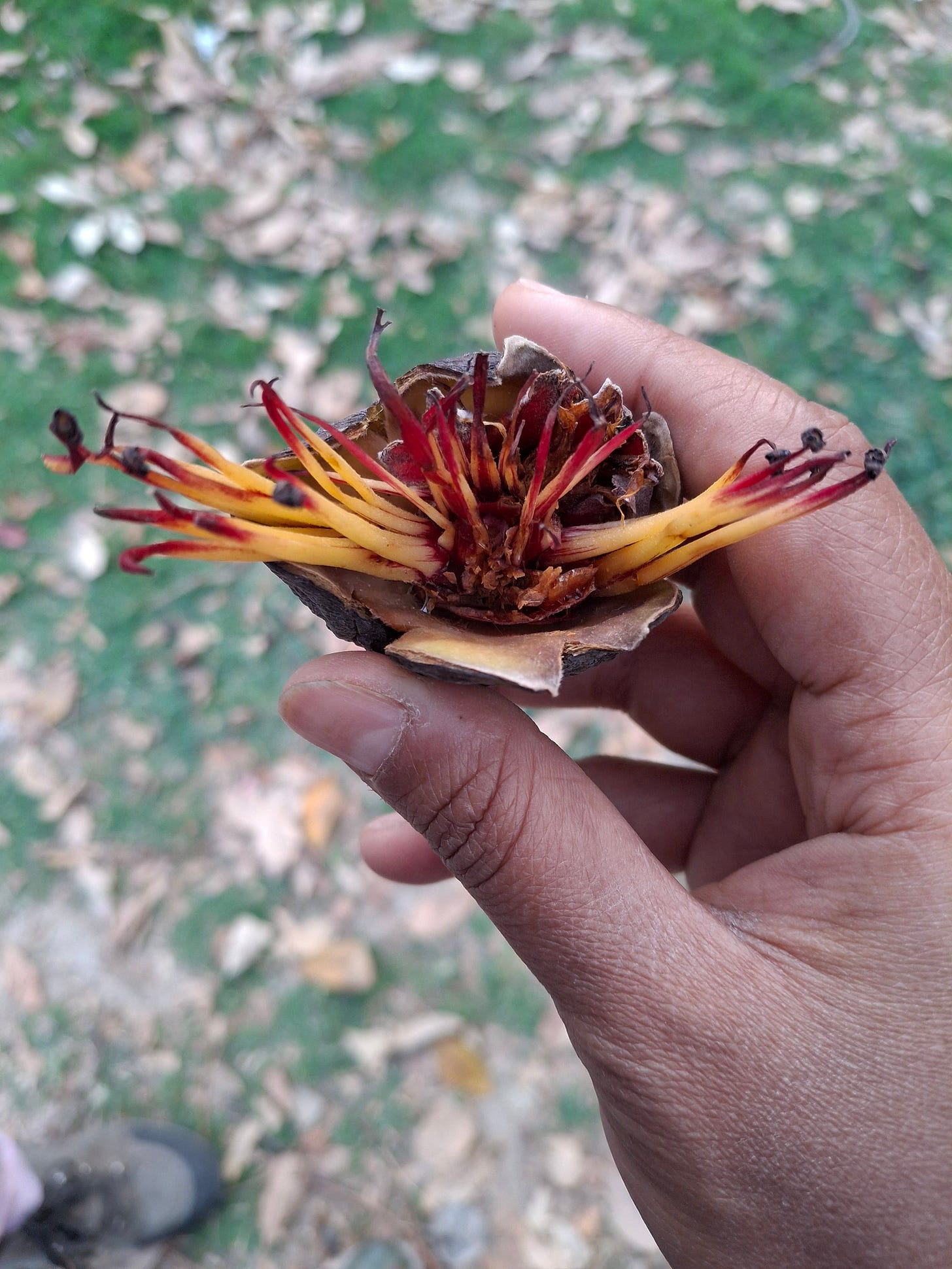
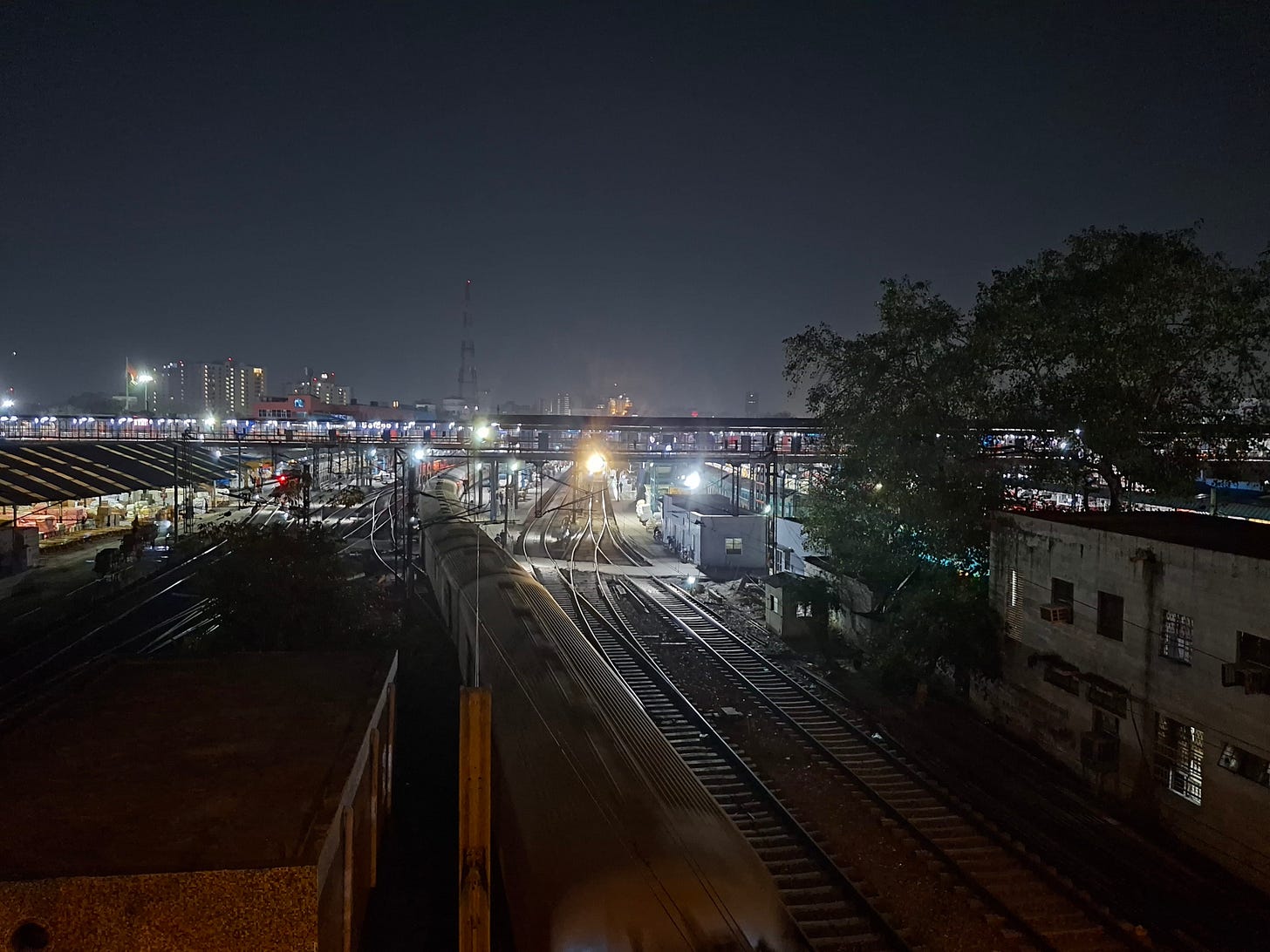
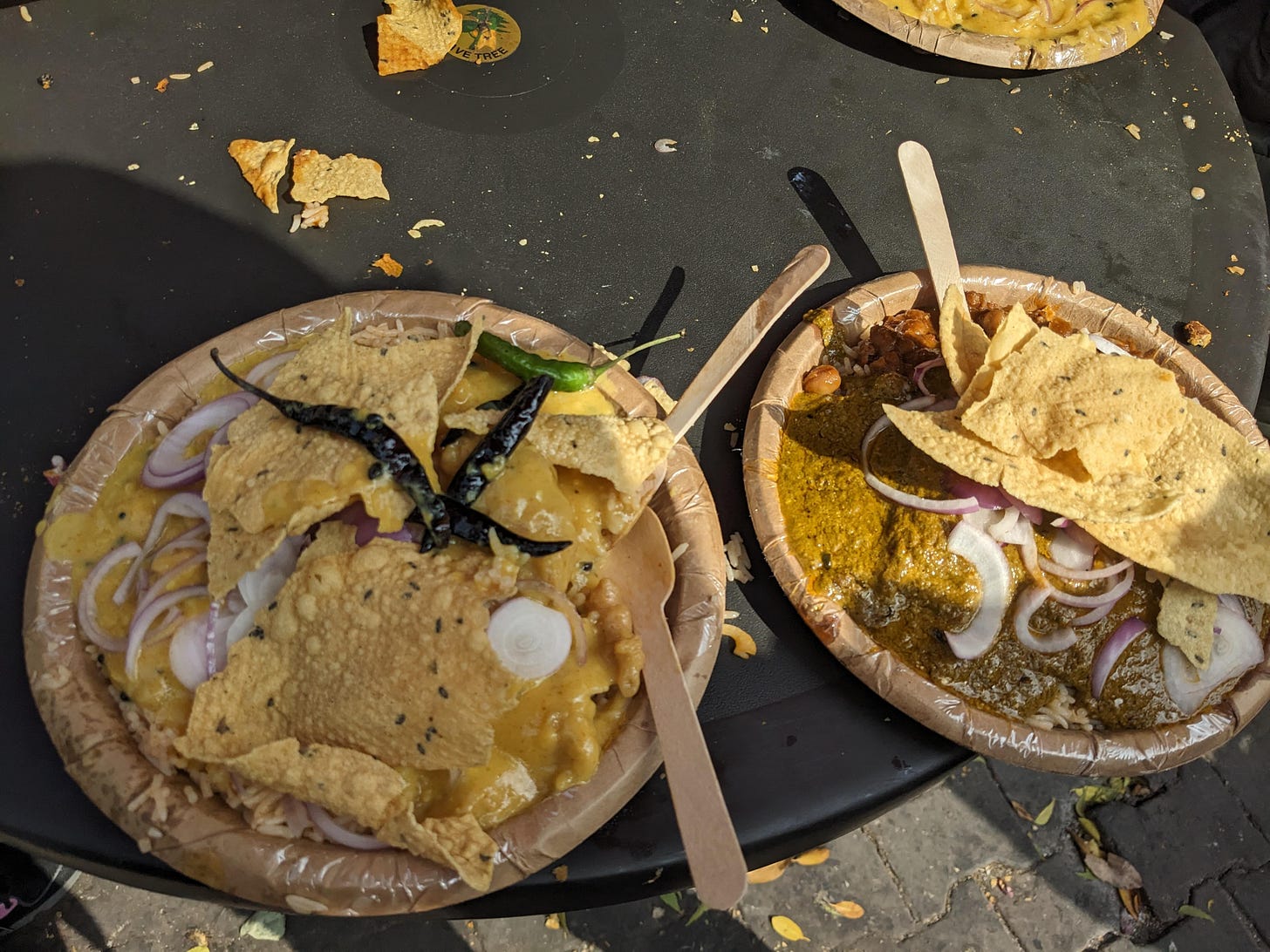


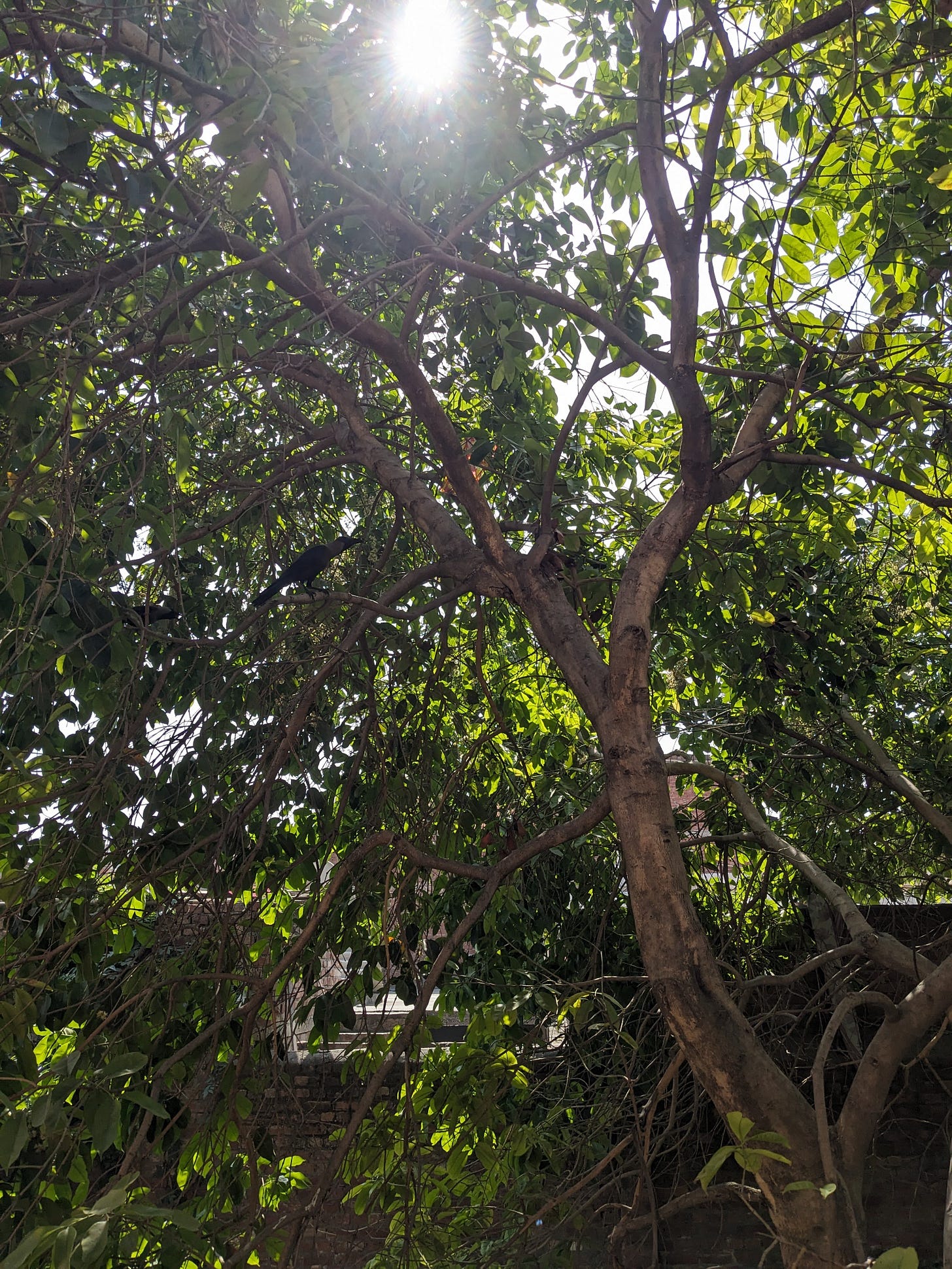
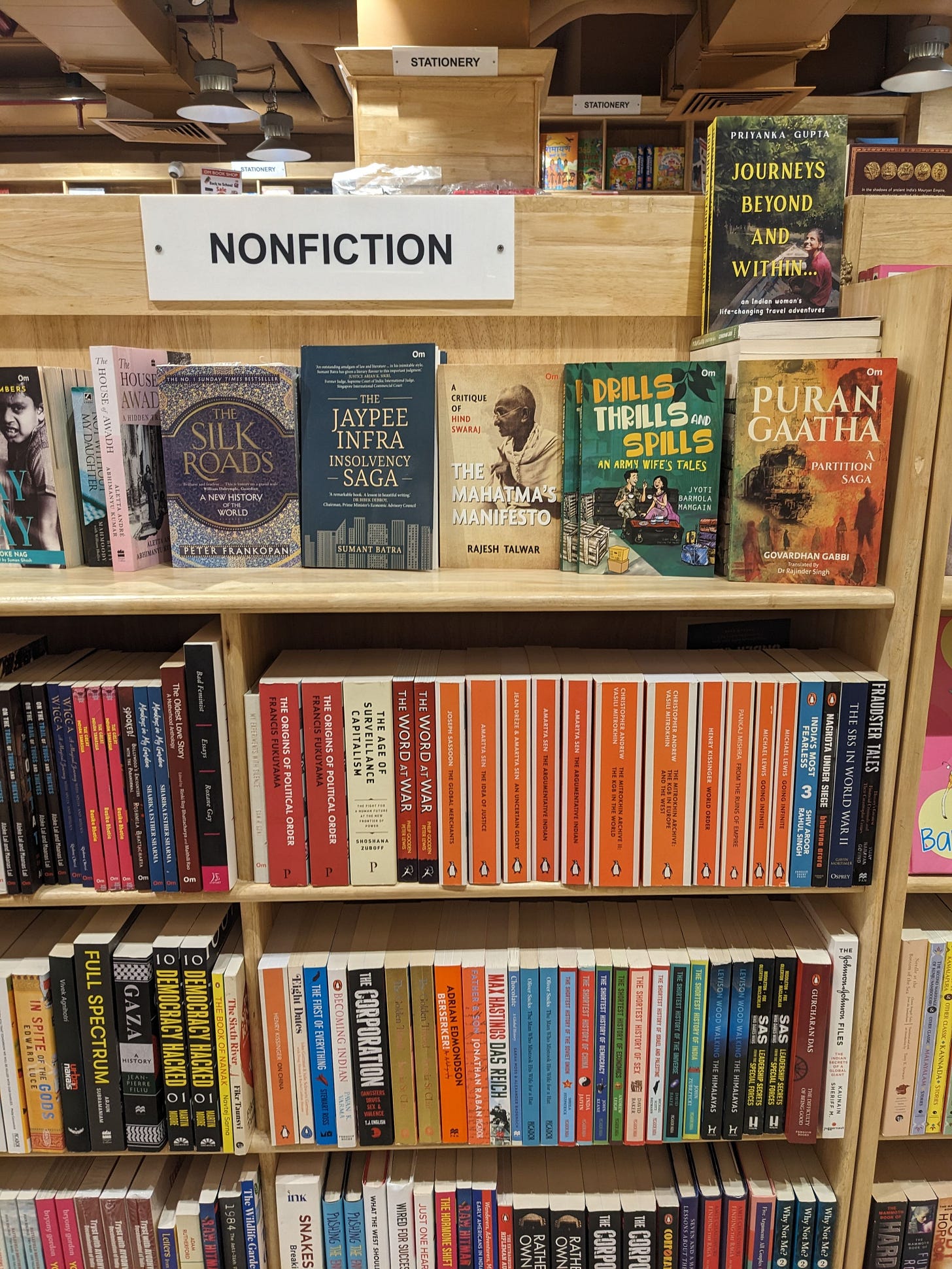
As always I loved your newsletter and sympathy with your effort of getting your book in stores . Me , as a farmer, struggle the whole year to get a good yield and fruit on the trees, battling weather, pests and diseases and all the efforts to get the fruit as nice as posible till the harvest and it being shipped off to the packing house to be marketed . Seeing the trucks leave with the fruit is the satisfaction of 11 months of work . I hope for you to see your book in stores all over India and beyond.... will give you that feeling of satisfaction . Keep up the good work , with me you have a happy reader.
BTW I ordered the book, waiting for it to be delivered. I hope the
commission they pay you is good , because Amazon charge me dubbel the price of the book for delivering.
Prof Tripathi tortured you with his maths, now he reads your book. Sweet revenge 😉